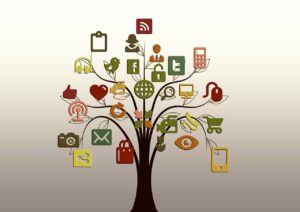
Introduction:
In this article we discuss the impact of information technology on society and how it has revolutionized the way we live, work, and interact with one another.
From advent of the internet to the proliferation of smartphones, IT has transformed various aspects of society. In this article, we will explore the profound impact of information technology on society, covering areas such as communication, education, healthcare, and the economy.
I. Communication: Breaking Down Barriers
1. Instant Communication:
Information technology has brought people closer together by enabling instant communication across vast distances. Email, messaging apps, and social media platforms have revolutionized the way we connect with one another. Individuals can now communicate in real time, facilitating collaboration, strengthening relationships, and breaking down geographic barriers.
2. Global Connectivity:
The internet has connected people from all corners of the world, fostering a global community. Social media platforms and online forums have provided avenues for individuals to share ideas, cultures, and experiences, promoting cross-cultural understanding and unity.
3. Enhanced Accessibility:
Information technology has made communication accessible to individuals with disabilities. Assistive technologies, such as screen readers and voice recognition software, have empowered people with visual or hearing impairments to communicate effectively, participate in online activities, and access information like never before.
II. Education: Revolutionizing Learning
1. Online Learning:
The emergence of e-learning platforms and educational resources has transformed the traditional classroom setting. Information technology has made education accessible to learners of all ages and backgrounds. Online courses, virtual classrooms, and educational apps have opened up new avenues for lifelong learning and skill development.
 2. Personalized Learning:
2. Personalized Learning:
Information technology has enabled personalized learning experiences. Adaptive learning platforms and intelligent tutoring systems use data analytics to tailor educational content to individual needs and learning styles. This approach enhances student engagement, promotes self-paced learning, and improves educational outcomes.
3. Global Knowledge Sharing:
The internet has become a vast repository of knowledge, allowing individuals to access information from around the globe. Online encyclopaedias, digital libraries, and open educational resources have democratized knowledge, enabling anyone with internet access to learn and expand their horizons.
III. Healthcare: Transforming the Medical Landscape
1. Telemedicine:
Information technology has revolutionized healthcare delivery through telemedicine. Also, remote consultations, telemonitoring, and mobile health applications have made healthcare more accessible, particularly in rural and underserved areas. Patients can now receive medical advice, access diagnostics, and monitor their health remotely, reducing the need for in-person visits.
2. Electronic Health Records (EHRs):
The digitization of medical records has streamlined healthcare processes and improved patient care. Electronic Health Records (EHRs) allow healthcare providers to access and share patient information securely, leading to more efficient diagnosis, treatment, and coordination of care.
 3. Health Tracking and Wearable Technology:
3. Health Tracking and Wearable Technology:
The integration of information technology and wearable devices has empowered individuals to take charge of their health and well-being. Fitness trackers, smartwatches, and health apps enable users to monitor their physical activity, sleep patterns, and vital signs. This real-time data can aid in preventive care and help individuals make informed decisions about their health.
IV. Economy: Driving Innovation and Efficiency
1. Digital Transformation:
Information technology has driven the digital transformation of industries, enhancing efficiency and productivity. Automation, data analytics, and cloud computing have revolutionized business processes, supply chain management, and customer service. This has resulted in cost savings, improved decision-making, and the ability to adapt to rapidly changing market demands.
2. Entrepreneurship and Innovation:
Information technology has lowered the barriers to entry for aspiring entrepreneurs. Online platforms, e-commerce websites, and digital marketplaces have provided avenues for individuals to start and grow their businesses. The digital economy has fostered innovation and created new employment opportunities, driving economic growth.
3. Remote Work and Flexibility:
The COVID-19 pandemic accelerated the adoption of remote work, highlighting the significance of information technology in facilitating flexible work arrangements. Virtual meetings, cloud-based collaboration tools, and project management software have enabled employees to work remotely and maintain productivity. This flexibility has the potential to improve work-life balance and reduce commute-related stress.
Conclusion:
Finally,the impact of i nformation technology on society has been profound, transforming the way we communicate, learn, receive healthcare, and conduct business.
The benefits of IT are evident in enhanced connectivity, personalized learning, improved healthcare access, and economic growth. It is also important to address the challenges of digital inequality, privacy concerns, and the potential for technology dependence.
By harnessing the potential of information technology, we can create a future where technology serves as a powerful tool for positive societal change







